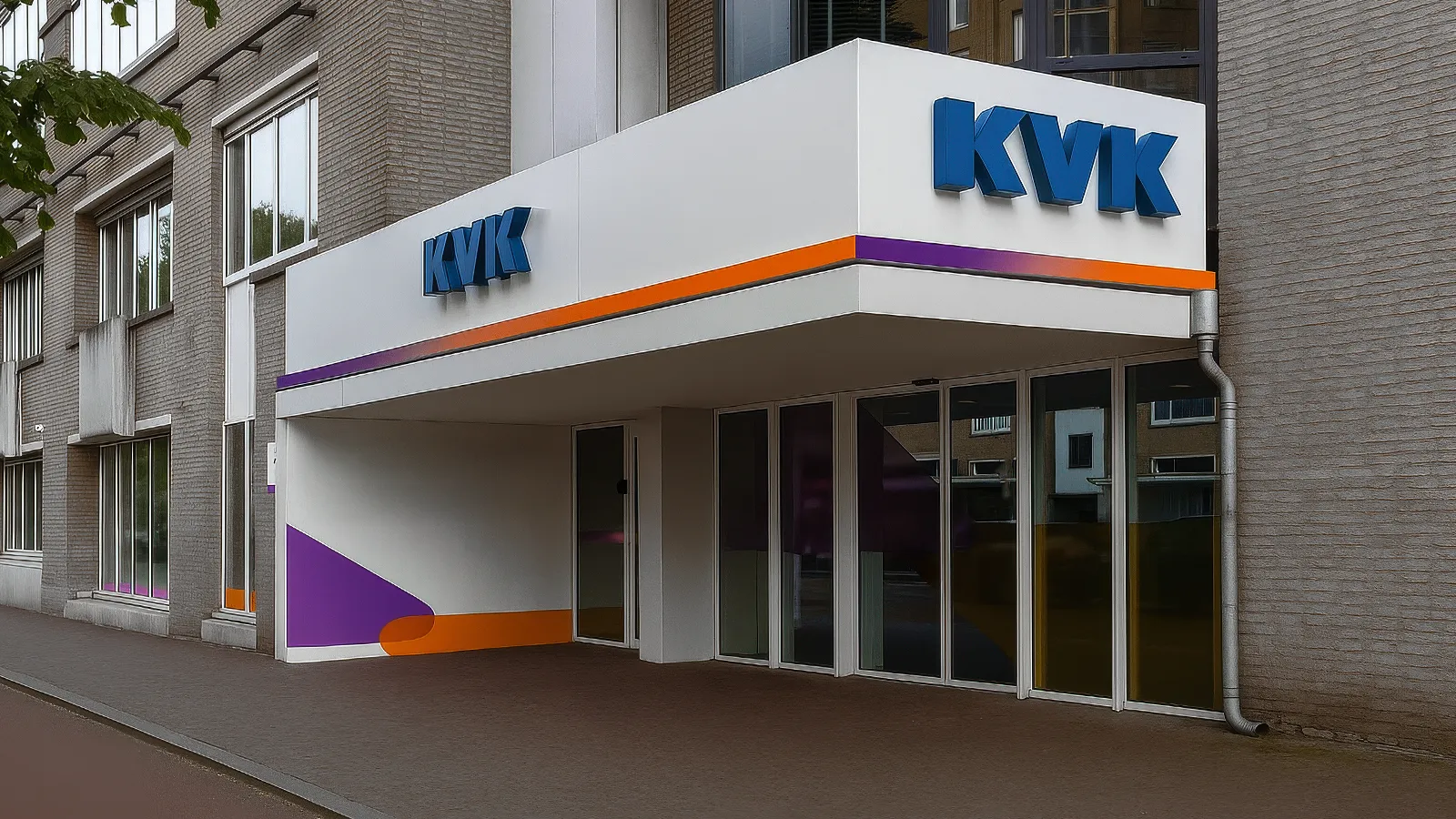
Obtaining a KvK number is one of the first mandatory steps if you are considering starting a business in the Netherlands. It is a registration number that serves as an essential legal identifier for any entrepreneurial activity conducted in the Netherlands. This article will provide all the necessary information about the KvK number, including its purpose, reasons for obtaining it, the registration process, and how it is used.
What is a KvK number?
A KvK number is a unique eight-digit registration code issued to companies and sole proprietors at the moment of registration with the Dutch Chamber of Commerce (Kamer van Koophandel, or KVK). This number serves as confirmation that the business is officially and legally registered and is also used for business identification. Thus, it allows third parties to verify a company’s legal status.
When is the number issued?
The KvK number is assigned during the registration process with the Chamber of Commerce. If the business activities will commence within the next eight days, the number is issued immediately. If the intended start date is set for later, registration can be completed up to three months before the actual start of work, and the KvK number will be issued one week before the business activities begin.
It is important to mention that if the legal form of the business changes, for example, transforming from a sole proprietorship (eenmanszaak) to a private limited company (BV), a new KvK number is usually assigned. Additionally, a change of business ownership requires a new number.
Where can you find the KvK number?
The KvK number can be found in various sources. Firstly, it is stated in the welcome letter that the business owner receives from the Chamber of Commerce after registration. Secondly, it is contained in the official KVK extract. Thirdly, the number can be found in the business owner’s online account on the “My KVK” portal. And finally, using the company name and address, it can be found through the public search function on the KVK website.
Why is the KvK number important?
The KvK number is essential for carrying out a wide range of legal and commercial operations. It is required for entering into contracts, opening business bank accounts, renting premises, obtaining insurance, dealing with wholesalers, and interacting with government agencies.
Moreover, Dutch law requires the KvK number to be stated on any official company document, such as invoices and commercial offers, business correspondence and emails, as well as on the company’s website.
What information is contained in the KvK register?
The KvK register contains complete information about the registered company, including the trade name, legal address, date of registration, legal form of the company, names of owners and directors, and identification numbers such as the KvK number, RSIN for legal entities, and others. Furthermore, it is possible to request and obtain extended extracts from the register, which may include financial statements, constitutional documents, and historical information about the company.
How does the KvK number differ from other identifiers?
The KvK number should not be confused with other identification numbers in the Netherlands. For tax purposes, the VAT number (BTW-nummer) is used, which is formed based on the KvK number and the RSIN. The RSIN (Legal Entities and Partnerships Identification Number) is mainly used for tax administration. The KvK number, on the other hand, is used for the legal identification and registration of the business.
Who is required to have a KvK number?
Everyone, including both individuals and organizations, who engages in entrepreneurial activity is required to have a KvK number. However, there are some exceptions. These exceptions exempt certain business structures from the need to obtain a KvK number, and such exemptions apply to non-profit organizations, religious institutions, government bodies, and homeowners’ associations (VvE), but only under certain conditions.
How to use the KvK number to check a business
You can use the public search function on the KVK website to check a potential supplier or business partner. You can search by KvK number, address, or company name. While more detailed reports, such as financial statements or ownership structure, can be purchased, basic information about a company is available for free.
Benefits of having a KvK number
Having a KvK number provides entrepreneurs with several benefits, including ensuring transparency and increasing trust from customers and partners. Additionally, it serves as an official authorization to conduct business activities in the Netherlands. Finally, it allows owners to enter into legally binding agreements and gain access to business platforms, credit opportunities, and government services.
Conclusion
The KvK number is not just a registration formality; it serves as the cornerstone of legal and recognized entrepreneurial activity in the Netherlands and is much more significant than just a registration requirement. Proper registration and use of this number open up access to a multitude of business opportunities and institutional support. Therefore, it is crucial for anyone looking to start and grow a business in the Dutch market to understand how the KVK system functions.
The KvK Number in the Netherlands: Everything You Need to Know
Obtaining a KvK number is one of the first mandatory steps if you are considering starting a business in the Netherlands. It is a registration number that serves as an essential legal identifier for any entrepreneurial activity conducted in the Netherlands. This article will provide all the necessary information about the KvK number, including its purpose, reasons for obtaining it, the registration process, and how it is used.
What is a KvK number?
A KvK number is a unique eight-digit registration code issued to companies and sole proprietors at the moment of registration with the Dutch Chamber of Commerce (Kamer van Koophandel, or KVK). This number serves as confirmation that the business is officially and legally registered and is also used for business identification. Thus, it allows third parties to verify a company’s legal status.
When is the number issued?
The KvK number is assigned during the registration process with the Chamber of Commerce. If the business activities will commence within the next eight days, the number is issued immediately. If the intended start date is set for later, registration can be completed up to three months before the actual start of work, and the KvK number will be issued one week before the business activities begin.
It is important to mention that if the legal form of the business changes, for example, transforming from a sole proprietorship (eenmanszaak) to a private limited company (BV), a new KvK number is usually assigned. Additionally, a change of business ownership requires a new number.
Where can you find the KvK number?
The KvK number can be found in various sources. Firstly, it is stated in the welcome letter that the business owner receives from the Chamber of Commerce after registration. Secondly, it is contained in the official KVK extract. Thirdly, the number can be found in the business owner’s online account on the “My KVK” portal. And finally, using the company name and address, it can be found through the public search function on the KVK website.
Why is the KvK number important?
The KvK number is essential for carrying out a wide range of legal and commercial operations. It is required for entering into contracts, opening business bank accounts, renting premises, obtaining insurance, dealing with wholesalers, and interacting with government agencies.
Moreover, Dutch law requires the KvK number to be stated on any official company document, such as invoices and commercial offers, business correspondence and emails, as well as on the company’s website.
What information is contained in the KvK register?
The KvK register contains complete information about the registered company, including the trade name, legal address, date of registration, legal form of the company, names of owners and directors, and identification numbers such as the KvK number, RSIN for legal entities, and others. Furthermore, it is possible to request and obtain extended extracts from the register, which may include financial statements, constitutional documents, and historical information about the company.
How does the KvK number differ from other identifiers?
The KvK number should not be confused with other identification numbers in the Netherlands. For tax purposes, the VAT number (BTW-nummer) is used, which is formed based on the KvK number and the RSIN. The RSIN (Legal Entities and Partnerships Identification Number) is mainly used for tax administration. The KvK number, on the other hand, is used for the legal identification and registration of the business.
Who is required to have a KvK number?
Everyone, including both individuals and organizations, who engages in entrepreneurial activity is required to have a KvK number. However, there are some exceptions. These exceptions exempt certain business structures from the need to obtain a KvK number, and such exemptions apply to non-profit organizations, religious institutions, government bodies, and homeowners’ associations (VvE), but only under certain conditions.
How to use the KvK number to check a business
You can use the public search function on the KVK website to check a potential supplier or business partner. You can search by KvK number, address, or company name. While more detailed reports, such as financial statements or ownership structure, can be purchased, basic information about a company is available for free.
Benefits of having a KvK number
Having a KvK number provides entrepreneurs with several benefits, including ensuring transparency and increasing trust from customers and partners. Additionally, it serves as an official authorization to conduct business activities in the Netherlands. Finally, it allows owners to enter into legally binding agreements and gain access to business platforms, credit opportunities, and government services.
Conclusion
The KvK number is not just a registration formality; it serves as the cornerstone of legal and recognized entrepreneurial activity in the Netherlands and is much more significant than just a registration requirement. Proper registration and use of this number open up access to a multitude of business opportunities and institutional support. Therefore, it is crucial for anyone looking to start and grow a business in the Dutch market to understand how the KVK system functions.






